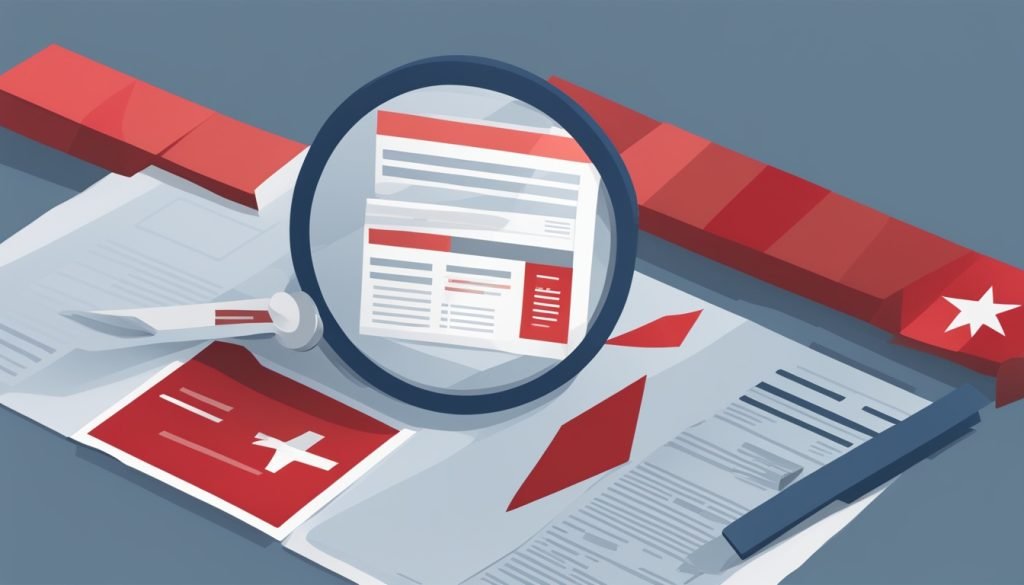Your credit score is vital for your financial health. It can impact getting loans or low interest rates. To make your credit score better, it takes time and work. But there are ways to start improving it. This will help you have higher credit scores and better credit ratings.
Key Takeaways:
- Review your credit reports regularly to assess your credit score and identify any errors or discrepancies.
- Make it a priority to pay your bills on time to demonstrate responsible financial behavior.
- Reduce your credit card balances and aim to keep your credit utilization below 30%.
- Limit requests for new credit to avoid generating multiple hard inquiries on your credit report.
- Lengthen your credit history by keeping old credit card accounts open and responsibly managing them.
Review Your Credit Reports
Starting to improve your credit score begins with checking your credit reports. Doing this will let you see where you stand and find any wrong information that might be hurting your score. It’s a key step to know your score for real.
Get a report from every big credit bureau – Equifax, Experian, and TransUnion. They keep track of your credit, like your debts and how well you pay them off, for example. Looking at reports from all three gives you the whole picture of your credit history.
Look closely at your credit score for any mistakes or old info. Make sure your personal details are right, such as your address and name. Mistakes here could lower your score. Also, check your debts and how you’ve been paying them off, as well as any hard looks at your credit.
It’s common for credit reports to have mistakes, which can hurt your score. That’s why checking them often is smart. It helps you find and fix wrong info or shady actions that might be lowering your score.
Knowing how much credit you’re using is key too. Aim to use less than 30% of what’s available to you. Using too much credit can make lenders think you’re risky. This could lower your score.
Keeping up with your credit reports lets you know your standing. Fixing errors and issues is easier when you catch them early. Next, let’s look into ways to boost your score.
| Credit Report Assessment Checklist | Actions |
|---|---|
| Check personal information accuracy | Update any incorrect or outdated personal information |
| Review payment history | Ensure all payments are accurately reported |
| Verify credit accounts | Check for any unauthorized or fraudulent accounts |
| Assess credit inquiries | Determine if there are any unauthorized credit inquiries |
Pay Your Bills on Time
Improving your credit score begins with timely bill payments. Missing payments negatively affects your score. This makes it hard to get loans or good interest rates later on. Paying on time shows you handle money well.
To avoid late fees, here are some tips:
- Set up due-date alerts: Use technology to get reminders about your bills. Alerts from your bank or an app can keep you updated. This way, you won’t forget a payment.
- Automate your bill payments: Set up automatic payments through your bank. This means your bills are paid on their own from your account. It’s a stress-free way to manage payments.
Following these steps will help you make payments on time. This is very important for your credit score. Being punctual with payments shows lenders you’re reliable. It can mean better deals and opportunities in the future.
The Importance of On-Time Payments
Paying bills on time helps your credit score and offers more benefits:
- Avoid late fees: On-time payments stop you from paying extra fees. These fees can become a big financial burden over time.
- Maintain financial stability: It helps you plan your budget and stay financially secure. This wards off stress and ensures you meet your financial duties.
- Build lender trust: On-time payments show you’re dependable. Lenders will trust you more, which can get you better loan terms and rates.
Building a good credit history is a long but important journey. Prioritizing on-time payments is a big part of it. It lays a strong foundation for your financial future.
“Paying your bills on time is key to good money management. It boosts your credit score and avoids extra fees. Plus, it’s good for your finances’ health.”
– Sarah Johnson, Financial Expert
Now you see how vital paying bills on time is. Let’s move on to more credit score improvement strategies in the next part.

Reduce Credit Card Balances
To boost your credit score, you should lower your credit card debts. It involves watching how much credit you use and cutting down your debt. This will make you look better to lenders.
Keeping your credit use under 30% of what you can borrow is smart. It shows you use credit responsibly. Lenders like this because it shows you are not too reliant on credit.
Focus on paying off high-interest or large balance cards first. Putting extra money there will help you reduce your debt faster. This is a good first step towards improving your credit situation.
Try not to use up all your credit as it can hurt your score. Instead, keep your credit balances low. This shows you can manage credit well.
If you’re good at making payments and have a steady income, you might get a credit increase. A bigger limit means you’re using a smaller percentage of your credit.
Managing your credit balances well is crucial for a good credit score. Always keep an eye on your debts and work on reducing them over time.
Limit Requests for New Credit
Improving your credit score means thinking twice before getting more credit. Opening or applying for new credit a lot can hurt your score and history. Every new credit application checks your report, which can drop your score.
It’s wise to limit how often you apply for new credit, saving it for when you really need it. Resist the urge to open many new accounts just for deals or rewards. Think about your goals, like buying a house or a big expense, when considering new credit.
Impacts of Hard Inquiries on Your Credit Score
When you seek new credit, a lender does a hard inquiry which shows on your report. This can slightly lower your score, temporarily. Lots of inquiries in a short time can make it look like you need money badly or are having money troubles.
This can make you seem riskier to lenders, possibly making it harder to get credit. So, it’s smart to keep hard inquiries few to protect your credit score.
To avoid credit score drops, try these tips:
- Look at different credit options to find the best for you.
- Don’t get too many store cards or apply for several cards at once.
- Work on making on-time payments and better your credit usage rate before asking for more credit.
- Think about using secured credit cards that don’t do as many checks to help you build credit safely.
Choose new credit wisely to keep your score high and your credit history strong. Quality is better than quantity in credit. Always handle credit responsibly.

Lengthen Your Credit History
The credit history you have often defines your credit score. It shows how well you’ve managed credit over time. The longer you’ve had credit accounts and managed them well, the stronger your creditworthiness seems. This gives confidence to lenders that you will pay them back.
Closing old credit card accounts can hurt the length of your credit history. This could lower your credit score. Even if you don’t use an old credit card, keeping it can help your credit history stay longer. It’s a good idea to keep these accounts open.
If you’re new to credit, there are options. You can start building a longer credit history. Becoming an authorized user on a family member’s credit card is one method. Pick someone with good credit habits. This will add their history to yours.
Opening a secured credit card is another choice. This type of card needs a cash deposit as security. It makes it safer for the credit card company. Paying on time and keeping low balances shows responsible credit use. This can help make your credit history longer.
To improve your credit score, focus on your credit history. Keep old accounts open and manage them well. Look after your new accounts too, and your credit history will grow strong. Always be smart with your credit, pay on time, and keep your balances low for the best credit history and scores.
Diversify Your Credit Mix
Lenders like to see different types of credit on your report. This includes credit cards, loans, and mortgages. It shows you can handle various kinds of debt. If you mainly have credit cards, think about adding a loan, like for a car or personal use.
Having a variety of credit helps your credit score. It shows you’re good at managing different financial duties. If you add a loan to your credit, you show you can pay it off on time. This boosts how reliable you look to lenders.
But, be careful when getting new credit. Only get what you know you can pay back. It’s key to balance having a good credit variety with not taking on too much debt.
Benefits of Diversifying Your Credit Mix
Diversifying your credit mix has many upsides:
- Improved Credit Score: It proves to lenders you can handle various credit responsibilities, which makes your score better.
- Expanded Credit Opportunities: It broadens your chance for future credit needs, like a mortgage or business loan.
- Lower Credit Risk: Spreading your credit out lowers the danger of depending too much on one type of loan.
When picking new credit, choose what fits your financial aims well. Managing these accounts smartly helps keep your credit positive.
| Credit Account Type | Description | Benefits |
|---|---|---|
| Credit Cards | Lines of credit you can use to buy now and pay later | – Easy and flexible payments – Rewards and cash back – Fraud protection |
| Installment Loans | Loans you pay back in steady amounts over time | – Help with big buys or investments – Fixed rates means no surprises – A chance to build a strong payment record |
| Mortgages | Loans for buying homes, usually with long payback times | – Homeownership investment – Tax breaks like mortgage interest deduction – Could grow in value over time |
Having a mix of these credit types can paint a good picture of your credit habits to lenders. Remember to be responsible, pay on time, and use credit wisely.
Conclusion
Boosting your credit score is vital for a better financial life. Using smart strategies can raise your score and improve your money matters. First, check your credit reports from Equifax, Experian, and TransUnion for mistakes.
Pay your bills on time to show you’re responsible with money. This helps your credit score go up. Also, try to keep your credit card balances low. It’s good for your score to use less than 30% of what’s available on your cards.
It’s smart not to ask for new credit often. And don’t open lots of new accounts at once. Keeping your old credit cards and mixing up the types of credit you have can help your score, too.
Improving your score won’t happen overnight. But it pays off with better loan offers and lower interest rates. Stick to these strategies and watch your financial opportunities grow.



